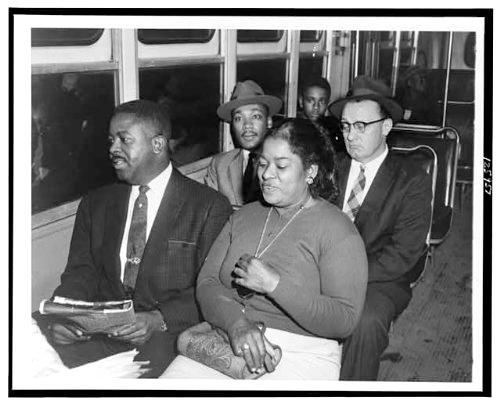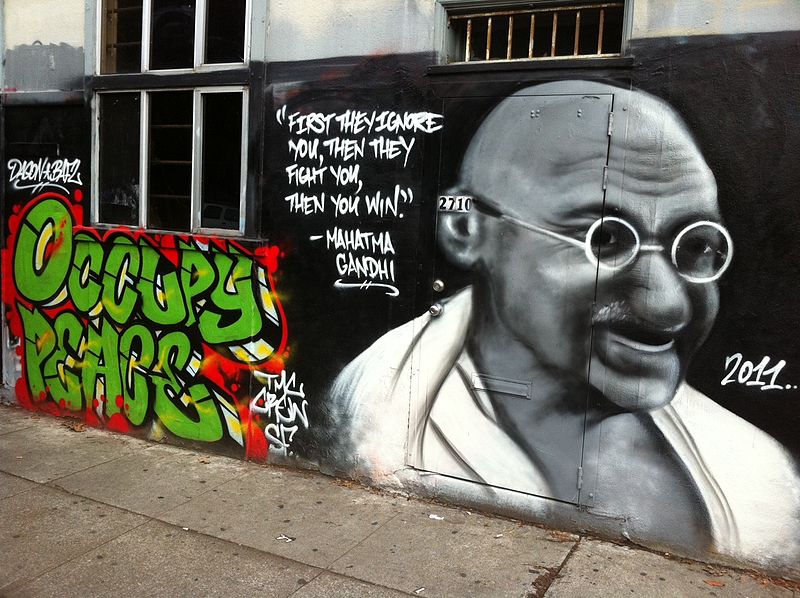Author Archive: Ken Butigan
KEN BUTIGAN is director of Pace e Bene, a nonprofit organization fostering nonviolent change through education, community and action. He also teaches peace studies at DePaul University and Loyola University in Chicago.
by Ken Butigan

Ralph Abernathy, Martin Luther King, Smiley and unidentified woman, 1956 Bus Boycott; courtesy wagingnonviolence.org
During a visit years ago to the Rock and Roll Hall of Fame in Cleveland, Ohio, I spent a lot of time at an exhibit where you could track the heredity of rock bands. Monitors displayed a family tree detailing what groups had influenced which bands. You could trace how particular acts had inherited, adapted or transformed genres, styles and musical innovations. For example, the Rolling Stones, to the best of my foggy recollection, were influenced by Muddy Waters, Robert Johnson, and Buddy Holly, as well as by Roy Orbison and the Kingston Trio. If even one of those ancestors was out of the mix, the Stones might have sounded very different — or maybe wouldn’t have formed in the first place.
by Ken Butigan
Editor’s Preface: We are posting today three interrelated articles about the remarkable Vatican conference concerning nonviolence and just peace, including this essay by Ken Butigan, Pax Christi International’s statement, and Pope Francis’s greeting to the conference members. The theory of “just war” has been the prevailing Church doctrine since postulated by Saint Augustine in the 4th century (CE). There have been previous attempts to redefine or challenge it, most notably Vatican Council II’s statement condemning war (mentioned in Pope Francis’s article below) and Thomas Merton’s many essays on nonviolence and pacifism, especially those collected in Passion for Peace: The Social Essays, (New York: Crossroad, 1996). In the lead essay from that volume, “The Root of War is Fear”, written in 1961 for The Catholic Worker, Merton writes that the “duty of the Christian . . . is to do the one task which God has imposed upon us in the world today. That task is to work for the total abolition of war.” But nuclear weapons signify a new reality demanding new paradigms. This conference engages the struggle. JG
The atmosphere of an unprecedented gathering on nonviolence at the Vatican — where change-makers from every part of the globe deliberated with priests, bishops and the Catholic Church’s top officer for justice and peace — was electric from beginning to end.
by Ken Butigan

Cover art courtesy PMPress.org
Years ago, my friend Anne Symens-Bucher would regularly punctuate our organizing meetings with a wistful cry, “I just want to live an ordinary life!” Anne ate, drank and slept activism over the decade she headed up the Nevada Desert Experience, a long-term campaign to end nuclear testing at the Nevada Test Site. After a grueling conference call, a mountainous fundraising mailing, or days spent at the edge of the sprawling test site in 100-degree weather, she and I would take a deep breath and wonder aloud how we could live the ordinary, nonviolent life without running ourselves into the ground.
What we didn’t mean was: “How do we hold on to our radical ideals but also retreat into a middle-class cocoon?” No, it was something like: “How can we stay the course but not give up doing all the ordinary things that everyone else usually does in this one-and-only life?” Somewhere in this question was the desire to not let who we are — in our plain old, down-to-earth ordinariness — get swallowed up by the blurring glare of the 24/7 activist fast lane.
These ruminations came back to me as I plunged into the pages of David Hartsough’s new memoir, Waging Peace: Global Adventures of a Lifelong Activist. David has been a friend for 30 years, and over that time I’ve rarely seen him pass up a chance to jump into the latest fray with both feet — something he’d been doing long before we met, as his book attests. For nearly six decades he’s been organizing for nonviolent change — with virtually every campaign, eventually getting tangled up with one risky nonviolent action after another.
by Ken Butigan
Historian by profession and relentless nonviolent advocate by calling, Vincent Gordon Harding died on Monday, May 19, at the age of 83. The author of a series of books on the civil rights movement — which he called the Southern Freedom movement — he not only wrote history, but also played an active part in the struggle to make and remake it.
Harding worked with the Student Nonviolent Coordinating Committee, the Southern Christian Leadership Conference, and the Mennonite House in Atlanta, an interracial voluntary service. As part of the Albany, Ga., movement, he was arrested for leading a demonstration at the city hall in 1962. He became a strategist for the movement, and drafted Martin Luther King’s historic 1967 anti-war speech “Beyond Vietnam,” which King delivered at Riverside Church in New York City one year to the day before his assassination.
by Ken Butigan

Cover of Berrett-Koehler edition; courtesy of the publisher
The Nonviolence Handbook: A Guide for Practical Action— a new volume by long-time peace and nonviolence scholar Michael Nagler published this month by Berrett-Koehler — offers the reader a crisp articulation of the dynamics, principles and contemporary application of Gandhian nonviolence that is both brief and clear. A scant 84 pages, including footnotes and an index, this publication really is a handbook in the classic sense: a short compendium of concise information about a particular subject, a type of reference work, a collection of instructions, and something “small enough to be held in the hand.” Nagler’s new book is, in this sense, a handy summary of the workings of nonviolent change and how it can transform our lives and our world.
In the interest of full disclosure, let me say from the outset that I was Nagler’s teaching assistant years ago and he, in turn, served on my degree committee in graduate school. I have always found his work a powerful contribution to nonviolent studies. I have used his publications in my teaching, including The Search for a Nonviolent Future, which I consider to be one of the best books ever written on the power of nonviolence. Even before meeting Nagler, though, his work influenced me strongly. As a neophyte activist in the 1980s I happened upon his America Without Violence, which opened up for a social change newbie a vision of nonviolence grounded in humanity’s potential. It helped strengthen my hope that enduring nonviolent transformation was possible.
by Ken Butigan

CO logo courtesy of War Resisters International; www.wri-irg.org
In our present age of permanent war, it is almost impossible to recall a time when armed conflicts clearly began and ended. In that ancient, bygone era, one could judiciously ruminate on an impending war before it got rolling and make a choice about it. Most people, even then, didn’t see it that way — for them there was no choice. If the government said, “War — jump to it,” invariably most of us said, “How high?”, whether that meant picking up a gun, plunking down our taxes, or throwing our full spiritual and political weight behind it. It seemed automatic and inevitable and foreordained. Choice, it seemed, had nothing to do with it at all.
But there was a choice, and some took it seriously. And even today, when war is on a dizzying spin-cycle whirling with such tremendous velocity that it virtually disappears before our very eyes — and when the ever-expanding remote-control battlefield increasingly exceeds every horizon — we still have a choice. Groping our way back to such a decision-point is crucial. Though it will be different than before — a choice made in the midst of the 24/7 careering, never-ending centrifugal spin and not amid the more contemplative lull that we once were afforded before all hell would break loose — this choice must be rescued and learned and applied, given the Pentagon and the National Security Agency’s monotonously relentless planning. What better teachers do we have than those who seized this opportunity in the past? Who better than those who chose.
by Ken Butigan
Awash in the churning tsunami of violence that crashes through our world almost hourly — in the last week of September and the first week of October 2013 it included the unspeakable suicide bombings in Peshawar, the terror attack on the Westgate Mall in Nairobi, and the horror of a mass shooting on a basketball court in Chicago — it is difficult to believe that violence does not firmly and implacably hold the upper hand. But we are living in a time — and in part precisely because of the catastrophic violence we face— when people everywhere, either out of desperation or a miraculously incongruous sense of hope, are turning to the nonviolent option. In spite of everything, a swelling movement across the planet is moving methodically forward with a mysterious confidence in the possibility of a third way.
by Ken Butigan
Stories are central to our existential job description: making sense of both the world and ourselves. From creation myths to scientific explanations, from political ideologies to the quirky narratives that knead our own amorphous lives into some kind of distinctive shape, stories are essential — not only because they nudge the disconnected bits of reality we face moment to moment into a plausible and graspable form, but because they go to the heart of our identity and purpose.
This goes for navigating our lives. But it also goes for changing the world.
When Dr. Martin Luther King, Jr. says that life poses two fundamental questions —What are we willing to live for? What are we willing to die for? — he presupposes a story that makes these questions intelligible. For Dr. King, this story centered on a harrowing and improbable expedition to what he doggedly called the Beloved Community, a world where all human beings will one day sit at the same table, live together in The World House, and make good on the hunch that the moral arc of the universe bends toward justice. This story does not come with a warranty or scientific proof. Instead its truthfulness depends on how far we’re willing to go to embellish and inhabit it. This story’s power flows, not from its lyrical metaphors, but from its ongoing, risky embodiment.
by Ken Butigan

“Then you Win”; Occupy graffiti;
Artist unknown; posted on
wagingnonviolence.org
For some time I have been increasingly convinced that, in spite of the horrific systems of violence and injustice that grind away, we are in the midst of a long-term “nonviolent shift.” By this I don’t mean we will create a utopia where conflict, violence, and injustice cease to exist. Interpersonal and structural violence — reinforced by a deeply rooted violence belief system — are grim realities that humanity will long have to face. The nonviolent shift, rather than portending an ideal society, here signifies a world where people are increasingly equipped with the tools to challenge, transform, and heal violence and injustice in a more powerful, creative, and effective way.
The Egyptian revolution, which began just over a year ago, was dedicated to ending a thirty-year dictatorship and sparking a long-term process of transformation within the country. But like many other powerful movements, it has also had unintended world-historical consequence that have helped to boost the momentum of this shift.
